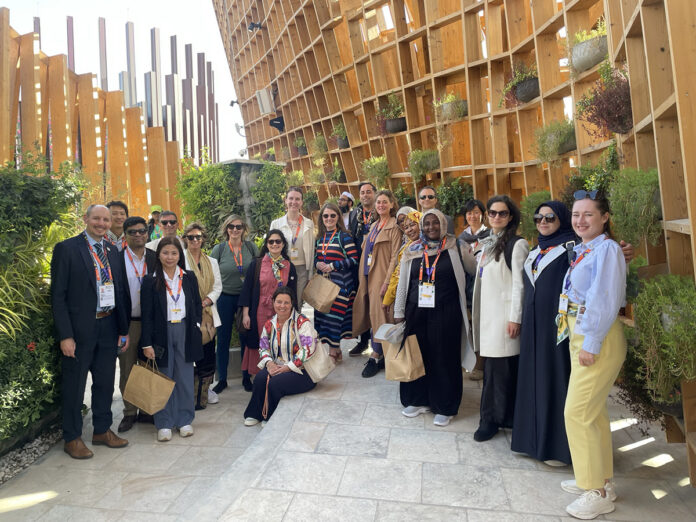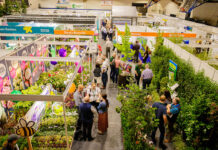Living green has a crucial role to play in developing liveable cities by contributing to social, cultural, environmental, physical, and mental health. Prominent researchers from around the globe presented their findings on the health benefits of urban greening at the ‘Living Green, Liveable Cities’ Research Symposium on 4th-5th February 2024 at Expo 2023 Doha, Qatar.
Organised by the International Association of Horticultural Producers (AIPH) in collaboration with Cities & Health and Expo 2023 Doha Qatar, the symposium presented research under three themes which demonstrate the contribution of ‘living green’ to healthy and resilient cities: Social and Cultural Health, Health and Wellbeing, and Environmental Health.
The opening session welcomed speakers from Doha. Ruben Munoz of the Gulf Organisation for Research and Development (GORD) presented the development and implementation of the Global Sustainability Assessment System (GSAS). Ruben explained how this is the first integrated and performance-based system in the Middle East and North Africa (MENA) region, designed for assessing and rating buildings and infrastructure for their sustainability impacts. Of high interest to the audience was the point that 42% of the weight of assessment criteria of GSAS is on preserving and enhancing vegetation.
Water sourcing and management is a major challenge for many countries around the world, including Qatar. Presenting traditional knowledge and practices towards sustainability, Dr Deema Almasri, Senior Policy Associate for Earthna, spoke about Earthna’s water studies. Dr Almasri explained: “The only fresh water source Qatar has is groundwater, which is currently being depleted at an immense rate – almost five times the rate of its recharge.”
To find solutions to this issue, Earthna has studied ancestral knowledge and traditional practices of water management in arid regions around the world to assess their scalability, efficiency, and suitability within the environment. Dr Almasri commented: “We need to tap into non-conventional water sourcing methods to maintain the water balance and secure a sustainable future in a country that is climate change resilient.”
In a similar vein, Dr Bruno Marques, President of the International Federation of Landscape Architects (IFLA), highlighted the significance of traditional Māori greenery practices and how they have been implemented in new projects in New Zealand.
Recovering traditional practices of indigenous peoples is vital not just to those communities, but to the environments they occupy. Dr Marques said: “With a history of colonisation and increased globalisation, many indigenous cultures have witnessed a decline in the quality of their natural ecosystems.”
Working in collaboration with Māori tribes, Torrens Terrace was developed in Wellington, New Zealand. This garden, in the heart of the city, grows plants used in Māori ceremonies. The benefits of this project are multilayered. In addition to being a therapeutic environment, the garden allows people of all cultures to learn more about the Māori people. Dr Marques added: “For Māori, who have become disconnected from their cultural roots, it offers opportunities for Indigenous groups to embrace their cultural identity.”
Another example of how thoughtful and intentional greenery can impact the social environment was presented by Dr Gayle Souter-Brown, Special Envoy from IFLA to the International Society of Urban Health. The case study focused on a school playground in London, UK, where there was very little greenery. “This community was at the time one of the most socioeconomically deprived in Europe,” Dr Souter-Brown explained. “They had all sorts of social problems and it wasn’t safe to be on the streets after 3pm.”
The redesign of the park included musical and wildlife sensory gardens, a space for outdoor education, the use of natural material in the play equipment, and edible fruit trees. “Not only did the children do better in school, but the ripple effect out across the community was profound. Now, the area attracts investment, and there is a waiting list for children to attend the school.”
Expo 2022 Floriade Almere in the Netherlands applied a similar understanding of the benefits of greenery on a larger scale. Judith van der Poel, Director of Niek Roozen Landscape, presented the World Horticultural Expo as an example of how plants can be used to improve the lives of citizens.
Over the past few years, the average temperature in the Netherlands has increased significantly. This has a multitude of detrimental effects, including the heightened risk of death. Van der Poel said: “Over four per cent of deaths in European cities during summer are due to the ‘heat-island-effect’. Extra trees in the city would avoid almost one third of those deaths.”
Tree canopy offers shade and helps to cool the surrounding area. Research in this subject informed the planting of trees at the Floriade 2022 site in Almere. New trees were planted alongside existing trees to create vibrant, green areas around each plot. Visitors to the Expo used the shade provided to relax.
Covering four sessions over two days, the audience enjoyed presentations about costs and benefits of vertical greenery, river regeneration, and urban air quality. They were inspired at how living green provides emotionally and physically restorative environments that also support biodiversity.
Visit the AIPH Website to watch the Symposium presentations on-demand.
AIPH Technical Initiatives Manager, Dr Audrey Timm, considers that the success of this symposium is that it promotes an understanding of how the latest research findings that were presented become best practice. “Discussions between speakers and delegates was a dynamic exchange of ideas for supporting research to practice.”
The Research Symposium accompanies the special Cities & Health journal issue, also titled ‘Living Green, Liveable Cities’. This special issue was instigated by AIPH and Expo 2023 Doha Qatar to investigate the science and practice supporting the concept showcased the Expo of creating liveable and healthy urban environments through city greening.
AIPH thanks collaborators Cities & Health and Expo 2023 Doha Qatar, and Partners Earthna, IFLA, and ISOCARP for their support of this event.










